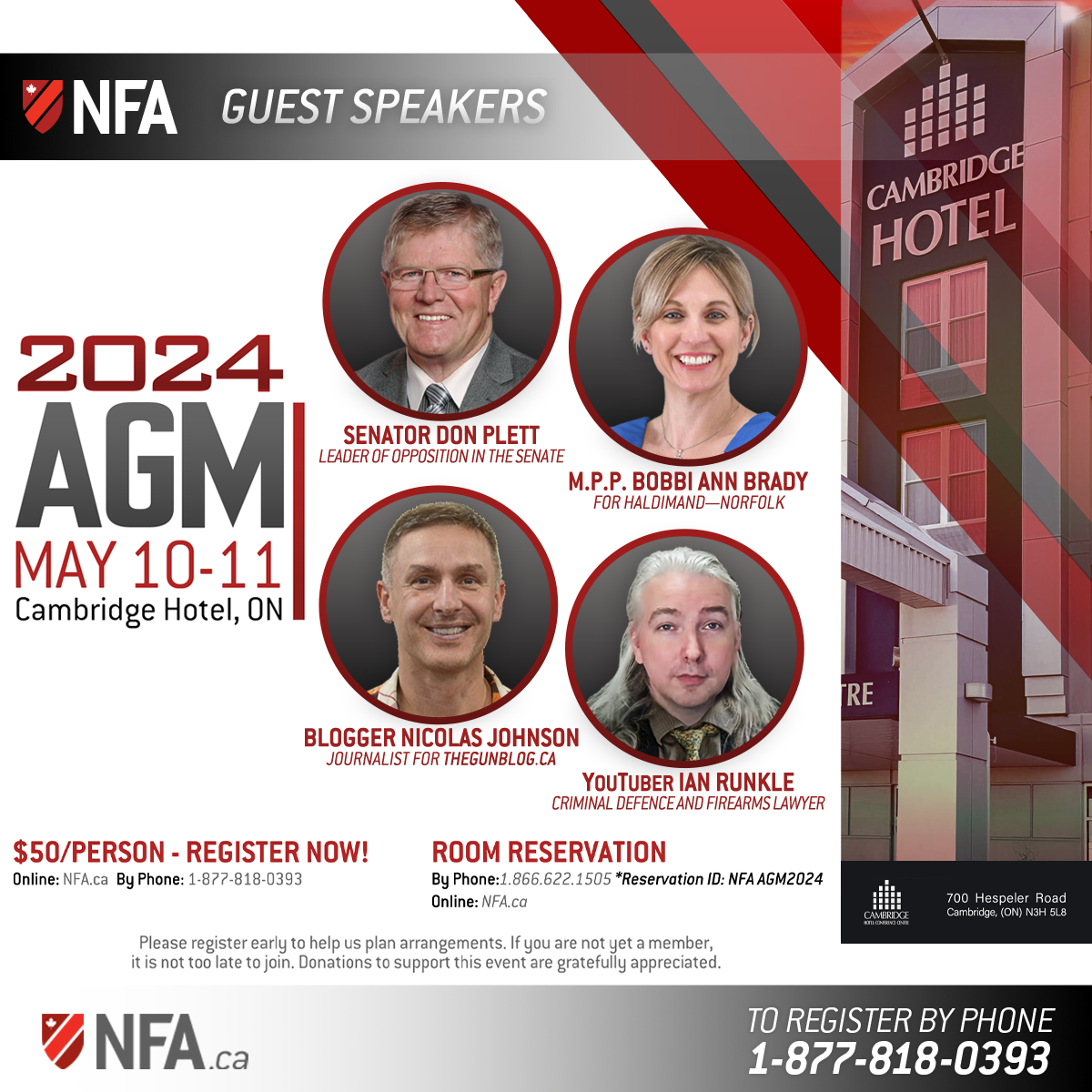Information for Executors regarding firearms
Question: Myself and my wife are going to have our wills set up through our lawyer, and I want to know how we should handle the firearms. I have an FAC, as well as several long guns, plus some registered (to myself) handguns.
What section of law should I tell my lawyer to refer to so that if I died, and my wife is the executor of my will, she could maintain control/ownership of my property? I am concerned that the gov’t would try to take my firearms away from her.
NFA: Criminal Code section [CC s.] 91(4)(d) authorizes the executor of an estate to take possession of any firearm (including a prohibited or restricted firearm). The executor can possess it until he “with reasonable despatch, lawfully disposes thereof or obtains a firearms acquisition certificate under which he could lawfully have acquired the firearm.” CC s. 92(4)(b) is the same provision, and operates in the same manner.
Can she acquire them without an FAC (as executor)? Can the restricted ones be registered to both of us?
NFA: Yes, she can acquire without an FAC or licence if she is the executor. Firearms cannot be registered to two individuals on one registration certificate, unless they were registered to two or more individuals on one registration certificate on 01 Dec 1998. Firearms can be transferred from one individual to another, after the first has his or her registration certificate, without transfer ofownership. If ownership is not transferred, then the old registration certificate is not automatically cancelled, and it remains valid — at the same time the new registration certificate is also valid.
If something happened to both of us, can I will some of them to the NFA as a donation?
NFA: Certainly. They then go into the hands of the executor, until a legal transfer can be arranged.
Thanks in advance for your info. I really like your articles in PointBlank, and find your comments to be very informative. (I just wish I could remember what you said regarding wills, executors, and firearms !!)
NFA: Worst case: If you own an illegal, unregistered full automatic machine gun, your executor can legally take possession of it, and legally take it to a gunsmith for alteration into a deactivated firearm without getting an Authorization to Transport. (That is because it is legally in his/her possession, and because no such Authorization can legally be issued.) The executor must stay with the firearm until it is deactivated, because the gunsmith cannot legally take possession of it — so it must remain, at all times until deactivated, in the possession of the executor.
Here is a document that you should print out and clip to your will. It is specifically designed to be given to a police officer who thinks that he is authorized to seize firearms from the executor of a will:
National Firearms Association
Law Enforcement Update
October 2000 © National Firearms Association
INHERITANCE AND TODAY’S LAWS
You have the unfortunate duty of telling a woman that her husband was killed in a hunting accident. Obviously, the man possessed firearms. What does the law say must happen to the firearm the man was carrying, and any other firearms he owned, upon his death?
The phrase, “by operation of law”, means the automatic transfer of legal possession from the deceased to the executor of his estate, as a part of the estate, at the moment of death.
This will help you to understand what you should and should not do:
Firearms Act section [FA s.] 112(1) says, “.. every person.. who…possesses [any unrestricted firearm] without being the holder of a registration certificate [covering it is guilty of an offence]…”
But — FA s. 112(2) says, “(2) Subsection (1) does not apply to…(b) a person who comes into possession of a firearm by operation of law…” (as an executor does).
CC S. 91(1) says, “…every person…who possesses [any] firearm [is guilty of an offence] unless the person is the holder of (a) a licence [covering it]…and (b) a registration certificate [covering it]…”
And CC S. 91 (2) says, “…every person…who possesses a prohibited weapon, a restricted weapon, a prohibited device, or any prohibited ammunition [is guilty of an offence] unless the person is the holder of a licence [covering it]…”
But — CC s.91 (4)(b) says, “Subsections (1) and (2) do not apply to (b) a person who comes into possession of a firearm, a prohibited weapon, a restricted weapon, a prohibited device or any prohibited ammunition by operation of law…”
CC s. 92(1), 92(2), and 92(4)(b) say much the same thing, and cover the situation where the accused does know the law, while CC s. 91 covers situations where the accused may not know what the law requires.The law set forth in C-68 is crystal clear.
Any firearm, prohibited weapon, restricted weapon, prohibited device, or prohibited ammunition that passes into the hands of an executor is legal, and possession by that executor is legal — for a “reasonable period”. All firearms and any of the other items listed held by the deceased — legally or illegally — become [if necessary, and temporarily] legal as they pass into the hands of the executor at the moment of death. The executor has broad exemptions granted to him by the law in order to let him settle the estate in an orderly manner, and with a minimum of firearms control system problems.
Law enforcement officers should, therefore, be very cautious about seizing firearms (and other listed items) that are involved in an inheritance process. There can be claims for damage due to poor handling or poor storage, as well as complaints of illegal seizure.The exemptions granted by FA 5. 112(2)(b), CC s. 91(4)(b) and CC s. 92(4)(b) are very broad. Even an obviously illegal, unregistered full automatic submachine gun, a sawed-off shotgun, or a FA s. 12(6) prohibited handgun temporarily becomes perfectly legal, temporarily. That happens when the death of its possessor passes it, automatically, into the possession of the executor of the estate — who needs no licence or registration certificate to be in possession of it.
If the deceased dies in possession of a “prohibited firearm” described in FA s. 12(6), that firearm can be passed on to the heir if the conditions set out in FA s. 12(7) are met.
If the deceased died in possession of a “prohibited firearm” that no one but a museum can have, the executor may legally transport it without an Authorization To Transport (ATT) — say, to a gunsmith for deactivation. (The executor must stay with it while it is deactivated, so that it is never illegally possessed by the gunsmith.) Once deactivated, it is still an asset of the estate, but it is no longer a firearm under the CC s. 2 definition of “firearm”.
The statement that an executor does not need an ATT requires explanation, as Parliament set up that exemption in two different ways, both having the same purpose:
CC s. 93 criminalizes only “the holder of an authorization or a licence under which the person may possess a firearm, a prohibited weapon, a restricted weapon, a prohibited device or prohibited ammunition” — if that person has the item at a forbidden location. An executor is not “the holder of an authorization or a licence under which the person may possess” the item. He or she is merely the agent for the real possessor — the estate. He or she has temporary possession only under the exemption granted to executors, so this section does not apply to an executor and cannot be used to charge an executor.
CC s. 94(4) provides an exemption to a CC s. 94(1) charge against an executor who is actually transporting such an item, and for anyone else who is in a motor vehicle with such an executor. That confirms that it was Parliament’s intent to exempt an executor from ATT considerations, as well as licence and registration certificate considerations.
However, the Storage, Display, Transportation and Handling of Firearms by Individuals Regulations apparently do apply to an executor, and must be obeyed by an executor.
If you have questions on this, or any other issue regarding firearms, the National Firearms Association would be pleased to answer them for you.
Please call us at (780)439-1394



